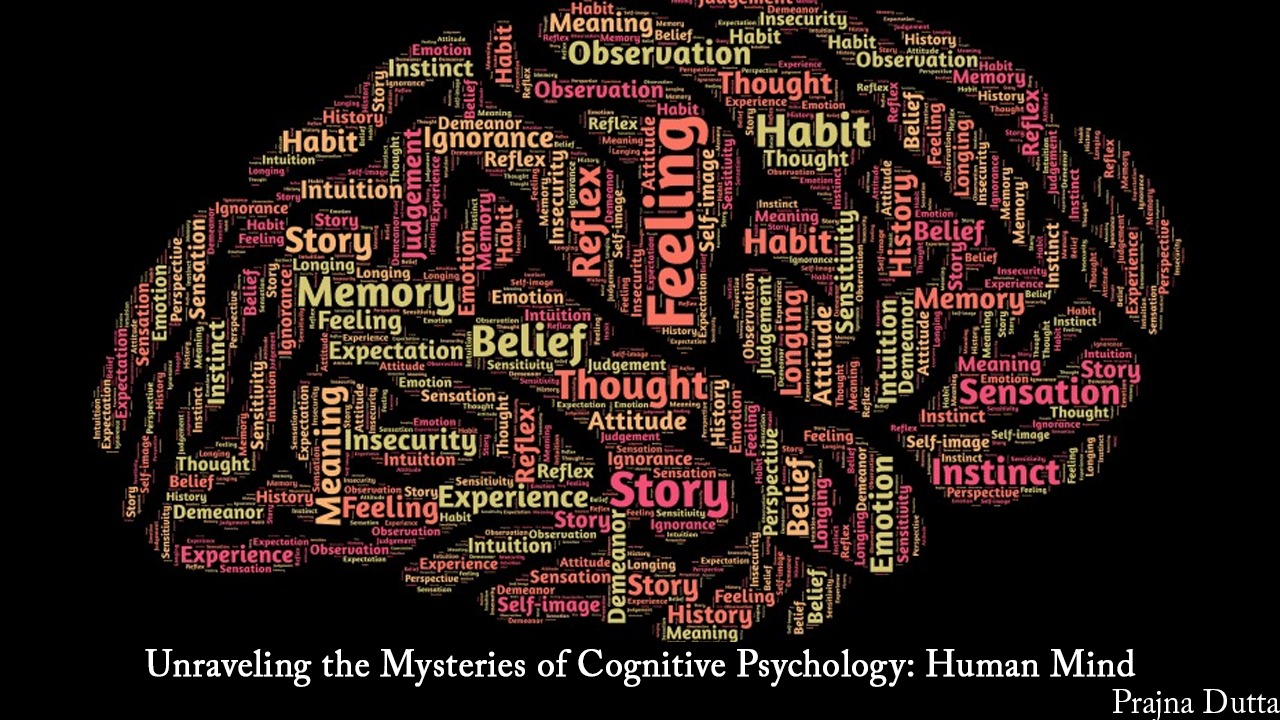Introduction:
Cognitive psychology is a branch of psychology that focuses on the study of mental processes such as perception, attention, memory, language, problem-solving, and decision-making. It explores how individuals acquire, process, and use information to understand the world around them. This field of study plays a crucial role in unraveling the mysteries of the human mind, shedding light on our cognitive abilities and limitations. In this article, we will delve into the fascinating world of cognitive psychology, exploring its key concepts, research methods, and real-world applications.
1. Historical Background:
Cognitive psychology emerged as a distinct discipline in the 1950s, challenging the prevailing behaviorist perspective that focused solely on observable behavior. Influenced by developments in computer science and information processing theories, pioneers such as Ulric Neisser, George Miller, and Noam Chomsky laid the foundation for the cognitive revolution. Their work emphasized the importance of internal mental processes and proposed the mind as an information-processing system.
2. Key Concepts in Cognitive Psychology:
a. Perception: Perception involves the interpretation and organization of sensory information from the environment. Researchers study how individuals perceive and make sense of visual, auditory, and tactile stimuli, exploring phenomena such as depth perception, object recognition, and attentional processes.
b. Attention: Attention refers to the ability to selectively focus on specific stimuli while filtering out irrelevant information. Cognitive psychologists investigate attentional mechanisms, attentional disorders, and the impact of attention on memory, learning, and performance.
c. Memory: Memory plays a fundamental role in cognitive psychology. Researchers study the various stages of memory, including encoding, storage, and retrieval. They explore different types of memory, such as sensory memory, short-term memory, and long-term memory, as well as factors that influence memory formation and retrieval.
d. Language and Thought: Cognitive psychology investigates the cognitive processes underlying language comprehension, production, and acquisition. It explores how language shapes thinking and how thinking impacts language use. Researchers also study the relationship between language and problem-solving abilities.
e. Problem Solving and Decision Making: Cognitive psychology explores the cognitive processes involved in problem-solving and decision-making tasks. It examines how individuals define problems, generate solutions, evaluate alternatives, and make choices. Researchers investigate factors that influence decision-making, including biases, heuristics, and problem-solving strategies.
f. Cognitive Development: Cognitive psychology explores how cognitive processes develop and change over the lifespan. Researchers study cognitive development in children, examining how thinking, problem-solving, and language abilities evolve. They also investigate cognitive changes that occur in adulthood and old age.
3. Research Methods:
Cognitive psychologists employ a range of research methods to investigate mental processes. These methods include experiments, observational studies, neuroimaging techniques (such as functional magnetic resonance imaging - fMRI), computer simulations, and cognitive modeling. These methods allow researchers to manipulate variables, measure cognitive performance, and gain insights into the underlying mechanisms of cognition.
4. Real-World Applications:
Cognitive psychology has numerous real-world applications across various domains. Some notable examples include:
a. Education: Cognitive psychology informs instructional design, helping educators develop effective learning strategies and optimize curriculum development. It provides insights into memory enhancement, attentional processes, and problem-solving techniques.
b. Clinical Psychology: Cognitive psychology has greatly influenced clinical practice. Cognitive-behavioral therapy (CBT), a widely used therapeutic approach, incorporates principles from cognitive psychology to treat mental health disorders. CBT focuses on identifying and modifying maladaptive thought patterns and behaviors, helping individuals develop healthier cognitive processes.
c. Human-Computer Interaction: Understanding cognitive processes is crucial for designing user-friendly interfaces and interactive systems. Cognitive psychology contributes to the development of user-centered design, optimizing the usability and effectiveness of technology by considering human cognitive capabilities and limitations.
d. Artificial Intelligence: Cognitive psychology plays a vital role in the field of artificial intelligence (AI). Researchers draw inspiration from human cognitive processes to develop intelligent systems that can perceive, reason, learn, and communicate. Cognitive psychology contributes to areas such as natural language processing, machine learning, and computer vision.
e. Advertising and Marketing: Cognitive psychology principles are widely applied in advertising and marketing strategies. Understanding how individuals perceive and process information helps marketers design persuasive messages, create attention-grabbing visuals, and influence consumer decision-making.
5. Current Trends and Future Directions:
Cognitive psychology continues to evolve, driven by advancements in technology and interdisciplinary collaborations. Some current trends and future directions in the field include:
a. Cognitive Neuroscience: The field of cognitive neuroscience integrates cognitive psychology with neuroscience, using techniques such as brain imaging to investigate the neural basis of cognitive processes. This interdisciplinary approach provides a deeper understanding of how the brain supports mental activities.
b. Embodied Cognition: Embodied cognition proposes that cognition is not solely reliant on the brain but is shaped by the interaction between the mind, body, and the environment. This perspective emphasizes the role of sensorimotor experiences in shaping cognitive processes.
c. Cognitive Aging: With an aging population, cognitive psychology research is focusing more on understanding cognitive changes associated with aging. Researchers explore factors that contribute to age-related cognitive decline, as well as strategies to maintain cognitive function and promote healthy aging.
d. Computational Modeling: Computational models based on cognitive psychology theories are being developed to simulate and predict human cognitive processes. These models provide valuable insights into cognitive mechanisms and aid in the development of intelligent systems.
Conclusion:
Cognitive psychology is a vibrant and multidisciplinary field that explores the intricacies of the human mind. By investigating mental processes such as perception, attention, memory, language, problem-solving, and decision-making, cognitive psychologists strive to uncover the underlying mechanisms that shape our thoughts and behaviors. The knowledge gained from cognitive psychology research has wide-ranging applications, from education and clinical practice to technology development and marketing strategies. As our understanding of the human mind continues to deepen, cognitive psychology will undoubtedly play a pivotal role in shaping our future understanding of cognition and its impact on human behavior.

Comments